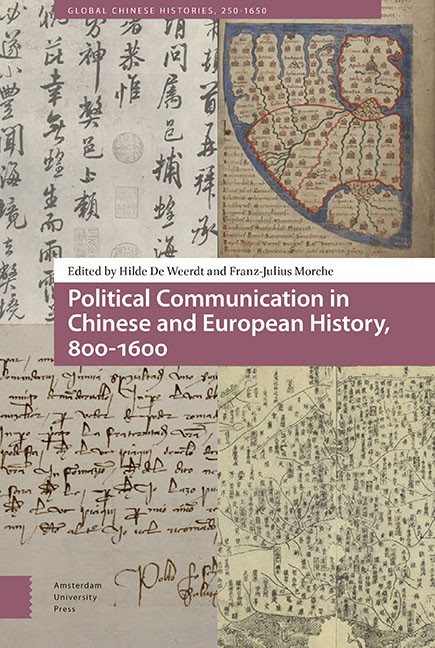Book contents
- Frontmatter
- Dedication
- Contents
- List of Figures and Tables by Chapter
- Acknowledgments
- Introduction
- Part I Communication and the Formation of Polities
- Part II Letters and Political Languages
- Part III Communication and Political Authority
- Part IV Memory and Political Imaginaries
- Epilogues
- List of Contributors
- Index
10 - Letters and Parting Valedictions: Zhang Yu and Political Communication in Mid-Eleventh-Century Sichuan
Published online by Cambridge University Press: 17 June 2021
- Frontmatter
- Dedication
- Contents
- List of Figures and Tables by Chapter
- Acknowledgments
- Introduction
- Part I Communication and the Formation of Polities
- Part II Letters and Political Languages
- Part III Communication and Political Authority
- Part IV Memory and Political Imaginaries
- Epilogues
- List of Contributors
- Index
Summary
Abstract
In eleventh-century China, a growing number of local men received a classical education and played a visible role in the government. Some passed the civil service examinations and held office, but those who did not also actively engaged themselves in local administration. These local men of culture, or local literati, had a dual identity: they were influential members of local society in their hometowns, but they were also participants in an empire-wide literati community that defined itself by a shared culture and supralocal networks. This chapter provides a case study of how local literati on the fringes of officialdom negotiated between these two identities and how they both cooperated with the state in local administration and protested against it in defence of local interests. The protagonist in this chapter is Zhang Yu, a Sichuanese literatus of the early Northern Song Dynasty who never held office but commanded great respect from local officials. Using his letters, parting valedictions, and commemorative inscriptions, this chapter explores how local literati provided political counsel and communicated their demands to the government. It argues that Zhang pursued, in different genres of his writings, several agendas that complemented one another. He eagerly fashioned himself as a true literatus in the metropolitan circles, which in turn strengthened his social standing and enabled him to weigh in on local policy and speak for local interests.
Keywords: Song Dynasty, local literati elite, participatory government, identity performance, political patronage, policy criticism
Having served for two years as the prefect of Yizhou 益州 (modern-day Chengdu), the regional centre of Sichuan, Tian Kuang 田況 (1005–1063) was appointed to the imperial court as provisional state finance commissioner (quan sansishi 權三司使) on 22 December 1050. On 2 January 1051, prior to his departure to the capital, a local scholar Zhang Yu 張俞 (1001–1064) composed a parting valediction (xu 序 or songxu 送序) and presented it to him as a gift. Composing valedictions for a departing friend or acquaintance was a common social practice in Tang (618–907) and Song (960–1279) times. These valedictions typically offered compliments, advice, and words of exhortation and encouragement to the recipient, who might either be in a higher or lower social position than the author himself.
- Type
- Chapter
- Information
- Publisher: Amsterdam University PressPrint publication year: 2021



